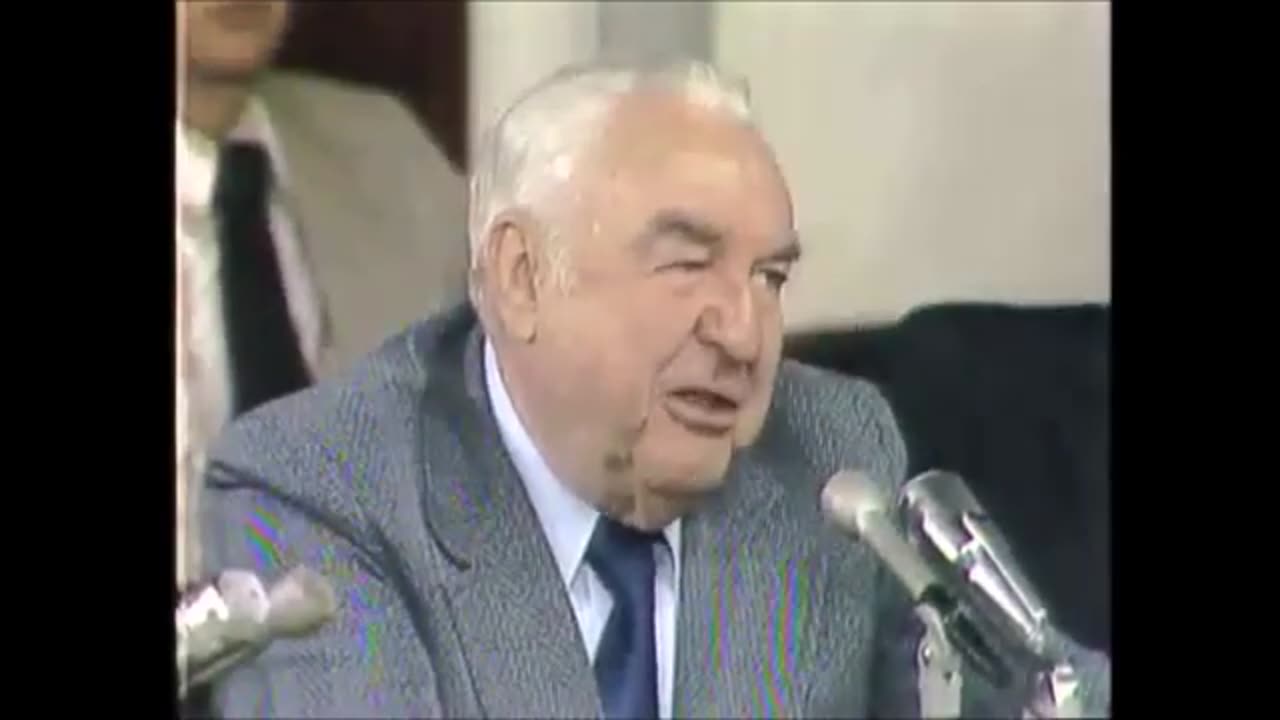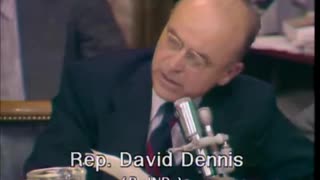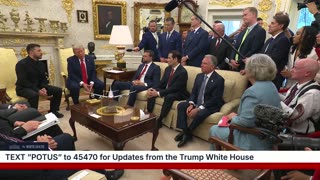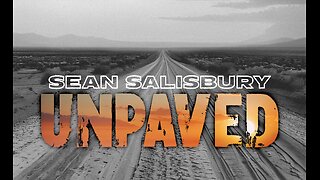Premium Only Content

Watergate Hearings Day 24: Fred LaRue and Robert Mardian (1973-07-19)
The dark side of history: https://thememoryhole.substack.com/
Frederick Cheney "Fred" LaRue, Sr. (October 11, 1928 – July 24, 2004), was an aide in the administration of U.S. President Richard Nixon. He served a short prison sentence for his role in the Watergate break-in and the subsequent Watergate scandal and cover-up.
Oddly, LaRue had no rank, title, salary, or even listing in the White House directory.[1] LaRue was present at an early meeting with his friend, United States Attorney General John N. Mitchell, at which the Watergate burglary was planned. Afterwards, LaRue assisted the cover-up, supervising the shredding of documents and the destruction of financial records.[2]
Biography
LaRue was a son of Isaac Parsons and Ruth (Quickenstedt) LaRue. His father later went to prison for violating banking laws, and, upon his release, made a fortune in the oil business. Fred LaRue sold one of their Mississippi oil fields for a reported $30 million in 1967.
Accidentally shoots his father dead
In 1957, LaRue accidentally shot and killed his father while hunting with friends in Canada.[3][4]
Business interests in pre-1959 Havana casinos and Las Vegas
With his newfound wealth, LaRue invested in many failed business ventures including casinos in Havana, Cuba, prior to the communist revolution, and in Las Vegas, Nevada. He also used his wealth to become a political financier and served as a member of the Republican National Committee from 1963 until 1968.
Associated with Senators Goldwater, Eastland and Thurmond
He was a heavy financial contributor to Barry Goldwater's presidential campaign in 1964. He was also a longtime friend of the Mississippi Democratic U.S. Senator James Eastland.[5]
After Goldwater lost the election, LaRue began getting involved with Nixon's career. LaRue was one of the principal planners of Nixon's so-called "Southern strategy" for winning the election. He coordinated with the campaign office of Strom Thurmond, the veteran U.S. Senator from South Carolina.
Nixon supporter, advisor to Attorney General John Mitchell
LaRue also recommended the use of a "special ballad-type song in the current 'country-and-western music style, by which nationally famous artists will sing the message via the radio and TV." The song was called "Bring Our Country Back" and included "alternate" lyrics with the couplet: "Dick Nixon is a decent man/Who can bring our country back." LaRue proposed broadcasting the song by local radio and television programs throughout the South. However, he had difficulty finding artists to perform the song; most that he contacted[who?] either sympathized with George Wallace, the former governor of Alabama, or did not want to help Nixon. Eventually, LaRue managed to convince Roy Acuff and Tex Ritter, who were unsuccessful Republican candidates themselves for governor and U.S. senator, respectively, in the state of Tennessee, to perform versions of the song.
LaRue coordinated with Eastland to obtain the confirmation of Nixon's judicial nominees. He has been described[by whom?] as a special assistant in an "advisory capacity" to then Attorney General Mitchell.
On March 30, 1972, LaRue attended a meeting in Key Biscayne, Florida, with Mitchell and Jeb Magruder. Mitchell, having announced his resignation as attorney general on February 15, assumed his new duties as head of the Committee to Re-elect the President, effective on March 1. The March 30 meeting has been the subject of great dispute among its three participants. According to Magruder, the three men approved the so-called Operation Gemstone and other aspects of a "dirty tricks" campaign against the Democratic Party. LaRue and Mitchell, to their deaths, always denied this vehemently. In 2003, Magruder stated, for the first time, that it was at this meeting that President Nixon, speaking to Mitchell by telephone, voiced specific approval for the Watergate burglary. Mitchell and Nixon had both been dead for years, and Fred LaRue denied Magruder's claim publicly.[citation needed]
'Bagman' for Watergate burglary pay-off
LaRue was known as the "bagman" because he delivered more than $300,000 in cash ("hush money") to the conspirators and their attorneys to keep participants of the Watergate burglary quiet.[1] LaRue was the first Administration official to plead guilty to crimes related to his involvement with the Watergate burglary and the cover-up.
Jailed for obstruction of justice
He pleaded guilty to obstruction of justice on June 27, 1973 and served four and a half months in custody at the Maxwell Air Force Base near Montgomery, Alabama. LaRue's fellow Watergate-convicts John Mitchell and Charles Colson also served their prison time at Maxwell AFB.
Life after prison
LaRue refused to testify against Nixon or any other Watergate figure. One of Nixon's first public appearances after his resignation as president came three years later in 1977 at a "Salute to the Military" in Biloxi, directed by LaRue.[citation needed]
LaRue died in Biloxi, Mississippi, and was cremated.[6] He was survived by his wife, Joyce Burleson LaRue, and six children.
References
Patricia Sullivan, "Watergate 'Bagman' Fred LaRue, 75, Dies", Washington Post, July 29, 2004.
Caro, Robert (2002). The Years of Lyndon Johnson: Master of the Senate. New York, NY: Alfred A. Knopf. pp. 102–103, p. 867. ISBN 0-394-52836-0.
Martin, Douglas (29 July 2004). "Fred LaRue, Watergate Figure, Dies at 75". The New York Times.
"Texan Killed at Kerrobert". Star-Phoenix. Saskatoon, Saskatchewan. October 18, 1957. p. 6. Retrieved September 8, 2021.
Caro, Robert: Master of the Senate, p. 102–103 and p. 867.
"Frederick Cheney LaRue, Sr". Findagrave.com. Retrieved August 16, 2017.
Portals:
Biography
flag Texas
flag Mississippi
icon Politics
icon Business and Economics
Authority control databases Edit this at Wikidata
Categories:
1928 births2004 deathsAmerican people convicted of obstruction of justicePeople from Athens, TexasMembers of the Committee for the Re-Election of the PresidentTexas RepublicansMississippi RepublicansPeople from Biloxi, MississippiPeople convicted in the Watergate scandal
Robert Charles Mardian (October 23, 1923 – July 17, 2006) was a United States Republican party official who served in the administration of Richard Nixon, and was embroiled in the Watergate scandal as one of the Watergate Seven who were indicted by a grand jury for campaign violations. His conviction for conspiracy was overturned because of procedural unfairness and he was not subsequently retried.
Family and early life
Mardian's father, Samuel, was from the Armenian town of Hadjin in the Vilayet of Adana in the Ottoman Empire (present day Saimbeyli in Mediterranean Turkey). He was born Samuel Zeligian into a Christian family and was a member of Second Congregational Church in Hadjin. Following the massacre of 35,000 Armenians in Adana in 1909 and the siege of Christian Hadjin Samuel escaped with his family and was in the United States by 1912. Samuel settled in California and supported progressive politicians such as Hiram Johnson and Franklin D. Roosevelt.
Samuel Mardian's four sons, however, adopted free-market politics. Robert Mardian's brother, Daniel Mardian Sr. founded Mardian Construction Company, a multi-million dollar concern, which contributed to Arizona's prominence and Samuel Mardian Jr. joined him as the vice president. Samuel Mardian also served as mayor of Phoenix, Arizona from 1960 to 1964, and was a leading supporter of Barry Goldwater.
Robert Mardian went to public school in Pasadena, California followed by Columbia University, North Dakota State Teachers College, and the University of California, Santa Barbara.[1][2] While serving in the United States Navy he met and married Dorothy Denniss in 1946. They had three sons. Mardian was awarded a law degree from the University of Southern California in 1949. After leaving law school he went into private practice as a corporate lawyer.
Politics
In 1956, Mardian, already active in the Republican Party, was appointed to a vacant seat on the Pasadena School Board. He was elected in 1957 but resigned shortly afterwards through pressure of work. From 1962, Mardian left his law practice to become vice president and chief legal officer of a savings and loan association. In the 1964 presidential election he managed the Goldwater campaign in four western states; although Goldwater was unsuccessful, his campaigning ability impressed Richard Nixon and he was appointed to the same position in Nixon's 1968 campaign. This time, of the four western states, the Republicans carried all but Washington. In the intervening years, he served as chairman of Ronald Reagan's state advisory committee during his 1966 gubernatorial campaign in California.
Nixon official
His work on the 1968 campaign led to Mardian becoming close to campaign managerJohn N. Mitchell. Mardian was appointed general counsel to the Department of Health, Education and Welfare in the Nixon administration. He supported Mitchell's 'Southern strategy' and advised the Department on ways of slowing the pace of school integration. His success in this post led to a promotion to Assistant Attorney General under Mitchell.
Mardian was in charge of the Internal Security Division, which headed up the fight against the radical left, prosecuting draft dodgers. He was entrusted to transfer to the White House the wiretap logs which had been discovered among J. Edgar Hoover's possessions in the Federal Bureau of Investigation after his death.
Watergate
Watergate scandal
The Watergate complex in 2006
Events
List
People
Watergate burglars
Groups
CRP
Committee for the Re-Election of the President Fred LaRue Jeb Stuart Magruder Robert Mardian John N. Mitchell Kenneth Parkinson Hugh W. Sloan Jr. Maurice Stans
White House
Judiciary
Journalists
Intelligence community
Congress
Related
vte
Mardian became involved in the Nixon administration's unorthodox campaigns early when he headed the federal prosecution of Pentagon Papers leaker Daniel Ellsberg in 1971. Although passed over for the appointment as deputy manager of CRP, Mardian was appointed as a 'political coordinator' with an uncertain role, as well as counsel for the committee.
The offense for which Mardian was convicted, but later cleared, occurred on June 17, 1972. Mardian was with other campaign officials in California preparing for a fundraising dinner. Having learned of the arrest of the five men in the Watergate complex, Jeb Stuart Magruder testified that at John N. Mitchell's suggestion Mardian telephoned G. Gordon Liddy and told Liddy to contact Attorney General Kleindienst, with an order that James W. McCord, Jr. should be released before his identity was discovered. Liddy insisted that the call had come from Magruder. Mardian always insisted on his innocence and since the trial has said that John Dean had the idea of calling Kleindienst. Mardian stated that he could have played no role in getting the burglars released, given his location and the difference in time zones.
On June 20, Mardian and Fred LaRue met with Liddy in LaRue's apartment in the Watergate complex, where Liddy told him the full story of 'the plumbers' activities. Mardian suggested to Liddy that he was likely to be traced and ought to give himself up; he also said that Mitchell was unlikely to let CRP funds be used to bail the Cuban burglars, but the Cuban community in Florida might help.
Indictment and trial
When Jeb Stuart Magruder decided to cooperate with the prosecution on April 10, 1973, it became certain that Mardian would be indicted, although he had first to go before the Ervin Senate committee (July 19–20, 1973).[3][4] Before the Senators, Mardian was an effective witness in defense of his actions. The grand jury nonetheless indicted him on March 1, 1974.
In January 1975, Mardian was convicted on one count of conspiracy to hinder the investigation. He was sentenced to 10 months to 3 years on February 21, 1975, but on appeal in 1976 the conviction was quashed. The United States Court of Appeals for the District of Columbia Circuit held that Mardian ought to have been tried separately because his lawyer, David Bress, fell ill two weeks into the trial, and because of Mardian's limited alleged role. The special prosecutor declined to retry him; in 1997 his appeal lawyer Arnold Rochvarg wrote a book outlining the legal history of the case and arguing that Mardian was innocent.
Later years
After leaving his campaign position, Mardian moved to Phoenix, Arizona to join the family construction business. He retired in 2002 and remained in Phoenix, with a summer home in California.
Before the May 2005 revelation that W. Mark Felt was the mysterious Watergate source known as "Deep Throat," some believed that Mardian had been the informant. When Felt was revealed to have been the source, Mardian told the Arizona Republic that Felt "betrayed his position" by leaking to The Washington Post.
Mardian died of complications from lung cancer on July 17, 2006, at his vacation home in San Clemente, California.
References
Sullivan, Patricia (July 21, 2006). "Robert Mardian; Attorney Caught Up in Watergate Scandal". The Washington Post. Retrieved April 26, 2022.
Martin, Douglas (July 22, 2006). "Robert Mardian, 82, Nixon Campaign Lawyer, Dies". The New York Times. Retrieved April 26, 2022.
1973 Watergate Hearings; 1973-07-19; Part 2 of 5, retrieved 2020-06-04
1973 Watergate Hearings; 1973-07-20; Part 1 of 4, retrieved 2020-06-04
The Watergate Hearings: Break-in and Cover-up (New York Times book) (Bantam Books, Inc., New York, 1973)
Watergate: The Corruption and Fall of Richard Nixon by Fred Emery (Jonathan Cape, London, 1994)
Watergate Victory: Mardian's Appeal by Arnold Rochvarg (University Press of America, Lanham, Maryland, 1995)
External links
U.S. Department Health and Human Services Bio of Robert C. Mardian
[1]
"Robert Mardian, One of the Watergate Seven – Obituary – The Independent www.independent.co.uk. Retrieved 2010-02-25.
Footage of Robert Mardian testifying before the Senate Watergate committee in the American Archive of Public Broadcasting: 7/19/1973, 7/20/1973
Authority control databases Edit this at Wikidata
Categories:
1923 births2006 deathsPoliticians from Pasadena, CaliforniaPoliticians from Phoenix, ArizonaAmerican people of Armenian descentColumbia University alumniUSC Gould School of Law alumniDeaths from lung cancer in CaliforniaUnited States Assistant Attorneys GeneralUniversity of California, Santa Barbara alumniCalifornia RepublicansArizona RepublicansSchool board members in CaliforniaPeople convicted in the Watergate scandalUnited States Navy personnel of World War II
-
 9:22:13
9:22:13
The Memory Hole
7 months agoNixon Impeachment Hearings Day 4 (1974-07-26)
1.02K -
 5:13
5:13
Members Club
5 hours agoProposal Fails You Won’t Believe 💍😂
3.78K4 -
 LIVE
LIVE
SportsPicks
3 hours agoCrick's Corner: Episode 66
56 watching -
 29:09
29:09
The White House
4 hours agoPresident Trump Participates in a Bilateral Meeting with the President of Ukraine
23.5K52 -
 1:47:30
1:47:30
Tucker Carlson
3 hours agoAuron MacIntyre: The American Empire Is Racing Towards Collapse. Here’s How to Prevent It.
67.4K65 -
 1:04:35
1:04:35
Mark Kaye
4 hours ago🔴 Trump and Zelenskyy Plan Oval Office Rematch!
19.5K3 -
 1:04:36
1:04:36
Sean Unpaved
3 hours agoBehind the Snap: Unpacking Giants' QB, Saints & Browns Battles, Caleb's Climb, & Cowboys' Plan B
32.6K -
 LIVE
LIVE
Barry Cunningham
7 hours agoBREAKING NEWS: PRESIDENT TRUMP MEETS WITH ZELENSKY AND OTHER WORLD LEADERS!
1,208 watching -
 LIVE
LIVE
Nerdrotic
6 hours ago $2.06 earnedSuperman GUNNED DOWN | Marvel Phase SUX - Nerdrotic Birthday Nooner 508
568 watching -
 18:52
18:52
Neil McCoy-Ward
3 hours agoBrace Yourself… They’re Coming for Everything You’ve Got!
12.4K9